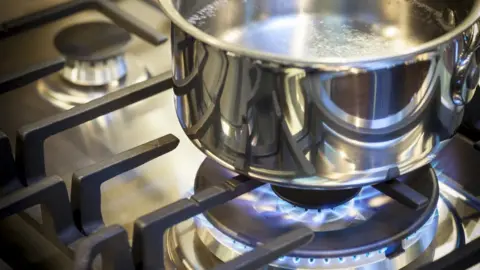'Big six' energy firm Npower to cut 900 jobs
 Getty Images
Getty ImagesEnergy giant Npower, one of the big six energy providers in the UK, plans to cut 900 jobs to save costs.
The energy firm said the number of redundancies would be "considerably lower" because of natural turnover.
The firm blamed "an incredibly tough" retail energy market for the decision and the government's new price cap which began at the start of January.
Npower employs 6,300 people. It said it was too early to say in which departments the cuts would fall.
However, a spokesman for the firm said it was aiming to preserve its customer service support team.
"Even with these reductions, we still forecast significant losses this year, but we're doing everything we can to minimise them whilst continuing to focus on service and value for our customers," said Npower chief executive Paul Coffey.
The government's new price cap will keep energy bills below £1,137 a year for "typical usage".
It was introduced to stop people who did not switch energy provider being stuck on expensive default deals.
Energy regulator Ofgem has said the cap will save 11 million customers an average of £76 a year on their gas and electricity bills.
However, many providers have said the cap has made the market unviable, with several smaller energy firms collapsing since it was announced.
 Getty Images
Getty ImagesMatt Lay, the national energy officer at union Unison, said Npower's announcement was "the tip of the iceberg".
"Npower isn't the only firm struggling. The UK's entire retail energy market is broken and in need of an urgent fix.
"Households across the country are now better off because of the price cap. But as more energy suppliers shed staff, or go under completely, it's businesses and consumers who'll end up picking up the tab," he said.
Merger derailed
Npower was due to merge its retail business with larger rival SSE last year, but the firms scrapped the plan after the cap was announced.
The merger would have seen SSE's household energy division, SSE Energy Services, combined with the retail operations of Npower, which is owned by Germany's Innogy.
SSE blamed the performance of the two businesses, the energy price cap and changing energy market conditions for the decision.
